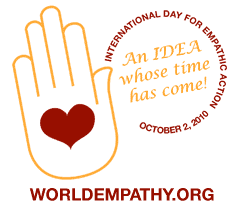Compassionate Communication
Oct.2nd, 2010
Gandhi Jayanthi
International Day for Empathic Action ( IDEA)
Workshop on
The Power of Empathy
Based on Nonviolent Communication as introduced by Marshall B. Rosenberg, Ph.D
( By George Polackal, Peace activist , NVC supporter)
( Former Principal, Cardinal Higher secondary School, Thrikkakara)
Time 10 am- 12-30pm
Venue: PUSHPA DARSANA (Little Flower Generalate, Thrikkakara, Kochi-21)
You are welcome! Since space is limited, kindly register in advance by phone, email or in person!
Email: geopolackal@yahoo.co.im
geopolackal@gmail.com
Phone – 04842425230(R) 9746773909(Mob.)
Empathy is a respectful understanding of what others are feeling and experiencing. True empathy requires listening with the whole being. "The hearing that is only in the ears is one thing. The hearing of the understanding is another. But the hearing of the spirit is not limited to any one faculty, to the ear, or to the mind. Hence it demands the emptiness of all the faculties. And when the faculties are empty, then the whole being listens. There is then a direct grasp of what is right there before you that can never be heard with ears or understood with the mind.
(Chuang-Tzu, the Chinese Philosopher)
Visit: http://georgepolackal.blogspot.com



 Spend an hour listening to a loved one share stories about their life.
Spend an hour listening to a loved one share stories about their life.